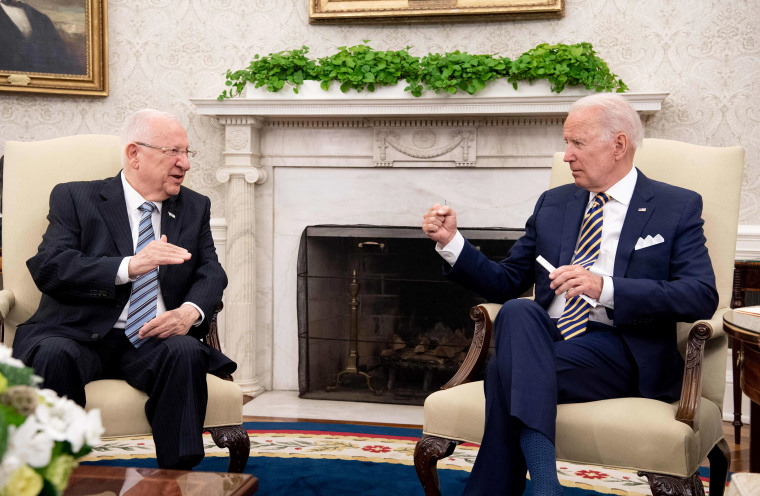President Joe Biden told outgoing Israeli President Reuven Rivlin on Monday that his commitment to Israel was "iron-clad" and vowed that Iran would never build a nuclear bomb during his administration.
The Biden administration is trying to revive the Obama-era Iran nuclear deal, which was designed to put limits on Tehran's ability to build a nuclear weapon but was abandoned by then-President Donald Trump in 2018.
Like Trump, Israel opposes the deal and sees it as too lax, even after Benjamin Netanyahu, a key Trump ally, was recently replaced as prime minister by a fragile coalition government.
In Iran, hard-liner Ebrahim Raisi has been elected president, replacing the more moderate Hassan Rouhani, which could have an impact on talks in Vienna aimed at reviving the nuclear deal.
"Iran will never get a nuclear weapon on my watch," Biden told reporters at the White House before going into the meeting with his Israeli counterpart Monday. He said Washington's "commitment to Israel" is "iron-clad."
He spoke alongside Rivlin, who is at the end of his seven-year term and will be succeeded as president July 7 by Isaac Herzog, currently chairman of the Jewish Agency, a nongovernmental organization that links Israel with the Jewish diaspora around the world.
At the White House, Rivlin stressed that the U.S. and Israel are "best friends" and that their relationship would always be founded on "the values of democracy and values of liberalism." But he also hinted at recent tensions: "We may, from time to time, hold discussions on issues on which we do not agree."

The U.S. and Israel say they want the same thing: to stop Iran from obtaining nuclear weapons. But they disagree on how to get there. Iran has always denied it wants such an arsenal.
In an attempt to revive the 2015 deal, its parties — the U.S., United Kingdom, France, Germany, China and Russia — have been meeting in Vienna since April.
During indirect talks, U.S. and Iranian negotiators have discussed the lifting of sanctions on Iran's supreme leader, Ayatollah Ali Khamenei, a former U.S. official and two people familiar with the matter told NBC News last week.
Now that Trump and Netanyahu are out of the picture, the Biden administration and the new Israeli coalition government have been focused on a far quieter type of diplomatic negotiations. But core differences remain.
"Israel has some serious reservations about the Iran nuclear deal that is being put together in Vienna," Israeli Foreign Minister Yair Lapid said in Rome on Sunday during a first meeting with Secretary of State Antony Blinken. But he added that "we believe the way to discuss those disagreements is through direct and professional conversation, not a press conference."
Download the NBC News app for breaking news and politics
It's not just the nuclear deal. Last month, Israel's recent conflict with Hamas, the Palestinian militant group that governs the Gaza Strip, caused dismay internationally including among congressional Democrats.
The 11-day fighting killed more than 250 Palestinians, including dozens of children, and 12 Israelis, including two children. The U.S. provides $3.8 billion in military aid to Israel annually.
At the White House, Biden "emphasized the importance of Israel taking steps to ensure calm, stability, and to support greater economic opportunities for the Palestinian people" and said that "a negotiated two-state solution remains the best avenue to achieving a lasting peace."
On Sunday, the U.S. launched airstrikes in Iraq and Syria against Iran-backed militia groups, which it said were behind drone attacks on American personnel.
Biden "reassured" Rivlin that the U.S. "remains determined to counter Iran's malign activity and support for terrorist proxies, which have destabilizing consequences for the region."
